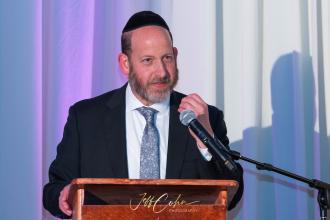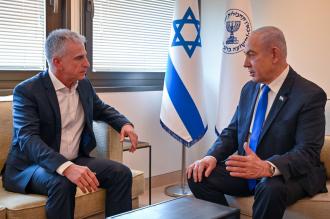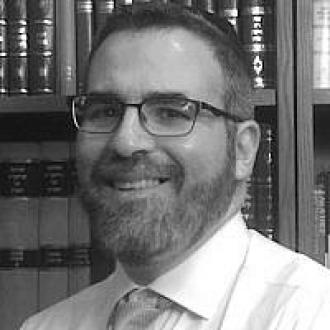And the Lord spoke to Moses after the death of Aaron's two sons, when they drew near before the Lord, and they died. And the Lord said to Moses: Speak to your brother Aaron, that he should not come at all times into the Holy within the dividing curtain, in front of the cover that is upon the ark, so that he should not die, for I appear over the ark cover in a cloud (Vayikra 16:1-2).
Aharon is commanded to limit his entry into the Holy of Holies to once a year, on the sacred Day of Atonement, Yom Kippur. The Torah proceeds to delineate the sacrificial obligations of the day and then goes into great detail as to the nuances and complexities of the Yom Kippur service.
Whenever I read this Parsha I am struck by one simple fact – Aharon was able to go on. After the tragic loss of his two precious sons, he continued forward and was able lead, inspire and create a meaningful relationship with God. But how? What was his secret? So many of us encounter challenge and tragedy (and sometimes of a lesser magnitude) and we get sidelined, we lose our way. How was Aharon able to continue in the face of unimaginable adversity?
To understand Aharon, we must look back at his initial reaction to the tragic developments. Upon hearing of the death of Nadav and Avihu the Torah states:
Then Moses said to Aaron, "This is what the Lord spoke, [when He said], 'I will be sanctified through those near to Me, and before all the people I will be glorified.' “And Aaron was silent (Vayikra 10:2-3).”
The commentaries try to explain the meaning of Aharon’s silence. According to some Aharon was so shocked and broken over the loss of his sons that he couldn’t speak, he couldn’t even cry - he was emotionally paralyzed, silent. According to others, Aharon’s faith was so solid and unshakeable that he accepted this difficult decree with a complete heart, never once questioning the decision of God.
The Tiferes Shlomo (Rabbi Shlomo Rabinowitz of Radomsk, 1801-1866) makes an amazing statement; “As great as Aharon was – King David was even greater. Aharon was silent; he did not complain, he did not even ask, “why?” He accepted the Divine will. However, King David said, ‘So that my soul will sing praises to You and not be silent. O Lord, my God, I will thank you forever (Psalms 30:13).’ King David pledged that no matter how difficult or turbulent his life circumstances, no matter what occurred - he would never stop singing. Aharon, through his silence accepted the Divine decree. Dovid not only accepted; he never stopped singing.”
Perhaps, it is not that King David was greater than Aharon, rather, he learned from Aharon. The Torah states:
“And Moses said to Aaron and to Elazar and to Ithamar, his sons, "Do not leave your heads unshorn, and do not rend your garments, so that you shall not die, and lest He be angry with the entire community, but your brothers, the entire house of Israel, shall bewail the conflagration that the Lord has burned. And do not go out of the entrance of the Tent of Meeting, lest you die, because the Lord's anointing oil is upon you." And they did according to Moses' order (Vayikra 10:6-7).”
Why couldn’t Aharon and his remaining sons mourn for Nadav and Avihu? Why did they have to continue to perform the Kohanic service during this emotionally trying time? The Torah answers this question in a nuanced fashion. In the beginning of Parshas Shmini, Moshe had to convince Aharon to come forward and assume the mantle of the priesthood. He said to Aharon, “Approach the altar (Vayikra 9:7)” and Rashi comments, “Moshe said to him (Aharon), why are you reticent (to approach)? You have been chosen for this.” Moshe was telling Aharon that becoming the Kohen Gadol, High Priest was not simply a job – it was Aharon’s destiny. From the moment you were created – this has been your mission. Aharon, you must lead, you must inspire, and you must help to heighten the spiritual awareness and sensitivity of the people. When there is something you must accomplish, you must be exceedingly vigilant to remain on task. When there is something you must do – you must make sure to continue on and surge forward no matter how turbulent the seas of life. Moshe told Aharon not to mourn as this would interfere with his mission and mandate. “Aharon, the people will mourn your loss – you must continue with your sacred task, you cannot be derailed.” Va’Yidom Aharon does not simply mean that Aharon was silent; it means that Aharon silenced all that was happening around him. He silenced his grief, he silenced his pain, he silenced his profound sense of loss and continued with his life mission and destiny.
In this respect, Aharon served as King David’s role model. David encountered much difficulty, suffering and set-backs, yet he looked at Aharon and understood the message of “Va’Yidom.” If Aharon could silence all that was happening around him in order to continue his life mission – I can do the same. L’Maan Yizamercha Kavod V’Lo Yidom, so that my soul will sing praises to You and not be silent – I will never be silenced, I will quiet all those things that seek to derail me – I will continue to sing.
We each have personal goals, desires and aspirations. We each have a destiny – something that we are supposed to do and accomplish during our time here on this world. Often, we begin on the path of accomplishment and some set-back, hardship, difficulty or challenge occurs and we stop. We stop moving, we stop actualizing our destiny. We are not Aharon. But we can learn his lesson. We must strive to become “Va’Yidom” people. We must pledge to reach our finish line, accomplish our mission and actualize our destiny. There will always be hurdles and obstacles over which we stumble and fall but we must find the courage to silence and never be silenced.














